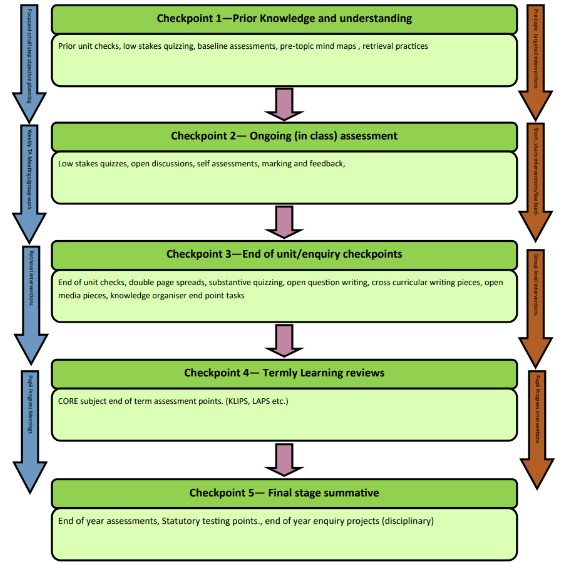At Northbrook Primary Academy, we are committed to creating a quality teaching and learning environment with high achievement as our aim. We recognise that not all worthwhile things can be formally measured and therefore we celebrate all achievement. The aims of assessment are:
- To provide information to identify and support the next steps in learning and inform planning for improvement or progression.
- To track individual progress for children and report this to parents.
- To gather information about the attainment of individual children, groups and cohorts so that it can be used to inform target setting.
- To analyse the performance of groups and cohorts of pupils to identify priorities for improvement and school development.
Our Principles for the Use of Assessment

Implementation of Assessment
Formative Assessment
Formative Assessment is an integral, continuous and daily part of the teaching and learning process at Northbrook. It informs future planning and motivates and encourages the children as they take their next steps in learning. Much of it is done informally as part of each teacher’s and each child’s day-to-day work. Formative assessment includes:
-
- Ongoing assessment against National Curriculum objectives throughout each lesson through questioning, observation and dialogue.
- Setting clear learning objectives – children knowing what they are being asked to learn and why.
- Providing progress checks using low stakes methods such as quizzes, mind maps and retrieval sessions.
- Feedback with clearly defined next steps (can be written or verbal).
- Providing assessment tasks to assess the way children apply all areas of their knowledge (Disciplinary and substantive). Can children demonstrate they have truly mastered their learning? E.g. by solving non-routine problems, explaining concepts, appraising, hypothesising, investigating, citing, designing, creating, proving.)
- Regular work scrutiny and moderation.
Summative Assessment Years 1-6
Summative assessments are used to assess what a child can do at a particular time, and are used as one part of overall teacher assessment.
-
- Year 1: Phonics Screening Check (June) – to include Year 2 pupils who did not meet the standard in Year 1. (Year 1 teachers also use some age and stage appropriate standardised assessment materials to assess pupils’ ability to meet end-of-year expectations.)
- Year 2: Progress tests based around the SATS Material (February)
- Year 6: SATS progress tests throughout the year.
- Years 1, 2, 3, 4 & 5: twice yearly assessment tests – Reading, Grammar, Punctuation and Spelling and Maths
- End of KS1 (Year 2) teacher assessments (using standardised assessment tests to help inform judgements) - reading comprehension and maths (June).
- End of KS2 (Year 6) standardised assessment tests - SATs - reading comprehension, maths, grammar, punctuation & spelling (May).
- Diagnostic tests for targeted children, which could include pupils with Special Educational Needs or those with English as an additional language.
- Termly review of Targeted Learning Plans (TLPs) for children with SEND
Childrens’ writing is assessed against the Lancashire Assessment Frameworks, which outline the curriculum expectations for each year group.
Assessment in EYFS
The children in EYFS are assessed against Development Matters. This is non-statutory guidance material that supports practitioners in implementing the statutory requirements of the EYFS, which are the Early Learning Goals (ELGs). The 17 different goals are divided into 7 areas of learning. These are grouped into Prime or Specific areas.
|
Prime Areas |
Specific Areas |
|
|
On-going formative assessment is at the heart of effective early years practice. This is done through practical assessment tasks and informal observations, made while working and playing with the children.
Baseline Assessment
Pupils complete the Reception Baseline Assessment (RBA) during the first half term of the academic year. The purpose of this is to provide an on-entry assessment of the child's attainment, which will then be used to judge how much progress a child makes during their time in primary school. The assessment takes the form of a twenty minute 1:1 session with the teacher.
EYFS Profile
At the end of the Foundation year, children will be judged against each of the seventeen Early Learning Goals (ELGs). Staff will judge and moderate together with the phase leader as to whether a child is meeting the level of development expected. They will be given a judgement of whether they have met the ELG (working at the expected standard) or are emerging in the ELG (working below or towards the expected standard). The key foundation stage performance indicator is “A Good Level of Development”. In order to achieve “A Good Level of Development”, children have to meet the expected level in all of the Prime areas of learning, as well as in Literacy and Mathematics.
The judgements are used to:
-
- Inform parents about their child’s next steps and the characteristics of their learning.
- Help Year 1 teachers plan an effective, responsive and appropriate curriculum that will meet the needs of each child.
Sharing Assessment Information
Reporting to parents
Annual reports to parents will identify gains in skills, knowledge and understanding, together with an outline for the next steps in learning.
Reporting to the Local Academy Council (LAC)
The Headteacher will report to the LAC on standards and school improvement, including analysis of attainment and progress data - on a termly basis.

